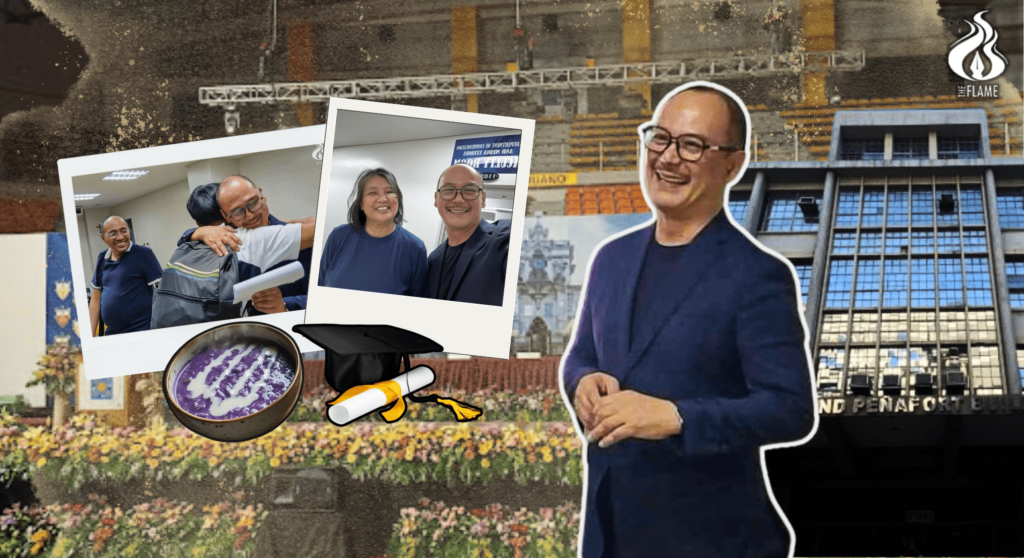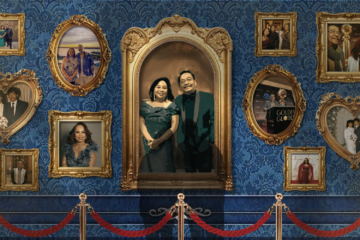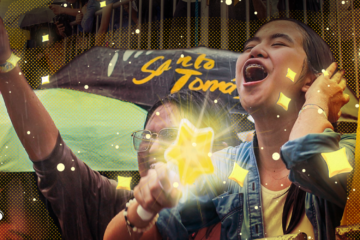
A NEW term has just started, and some Thomasians are anxious about the academic load and drama that await them.
Not Roberto Solis.
After taking a break from his studies in the 80s, the 64-year-old Journalism student and fashion expert is finally in the final stretch of earning his degree. He is just finishing his remaining school requirements, having defended his thesis last Dec. 7.
His successful defense of his study about the news reports on fashion statements during the State of the Nation Address was covered by The Flame and was subsequently picked up by mainstream media, making him a reminder that the chasing of a dream is only limited by one’s determination.
Room 1105 at the BGPOP building became a silent witness to the climax of what Solis described as a a ‘nerve-wracking’ journey to a degree he had set aside 40 years ago. He is just a few documents and a thesis revision away from his college diploma.
“I never defended like that before. I was performing on stage as a singer in Tokyo, but not like that,” Solis, who is known to his classmates as “Tito Bobby,” told The Flame.
Fashion as passion
Solis first enrolled in the University under the Journalism program in 1979 and became part of the UST Chorus of Arts and Letters. He began to pursue singing as a career when he auditioned for a dinner theater at Hotel Mirador in Manila.
Because of his commitments to theater, Solis had to pause his studies. His dedication to performing arts and fashion spanned more than four decades, with his last job being a fur expert at Louis Vuitton until his retirement in 2023.
He decided to go back to UST in January last year to complete an unfinished business—his undergraduate studies.
Having worked as a fashion expert, Solis was able to use his expertise in the industry and bridge fashion and journalism in his thesis titled “SONA Fashion: Language, Themes, Newsworthiness and News Values in the Philippine Media Coverage,” which looks into the State of the Nation Address as an “intersection of power and style” and a platform to showcase fashion and status beyond political agendas.
“My work can delve into how media narratives focus not only on the speeches and political discourse but also on fashion as a form of soft power,” Solis said.
He noted that the fashion choices of different personalities, including politicians and celebrities, in the annual address highlight key news values such as prominence and public interest.
“By analyzing newsworthiness and news values, my research could provide critical insights into media priorities and cultural dynamics in Philippine society. This is particularly relevant as SONA fashion often reflects broader socio-political and economic trends,” he added.
‘Nerve-wracking’ journey
When Solis decided to go back to his academic pursuits, he knew that the journey would not be easy. During the second semester, he almost gave up on his thesis.
Solis was supposed to join a thesis group that had already been working on a research topic since the first semester. However, he insisted on working alone as he refused to disrupt his peers who already made significant progress.
Despite momentary setbacks, Solis inched closer to what would become a successful thesis defense with the help of his research adviser Marishelle Medina.
“That journey from the second semester—doing the thesis, creating everything, I was doing all the legwork, research work and everything, but she (Medina) put them all together for me,” he said.
“Nerve-wracking, I almost gave up.”
According to Solis, Medina’s support was an “instrumental” part of his journey as she constantly pushed him to strive for excellence.
“She said, ‘No one has failed in my thesis yet, and you will not be the first one.’ I took that to heart,” he said.
Medina, a Journalism instructor, said it took Solis about a year to work on his thesis and familiarize himself with modern academic demands.
“He was able to do it, was able to finally defend it this month. He didn’t need to do that [since] he’s very accomplished, but he returned to school to finish college,” Medina said.
The journalism instructor said she was proud of Solis for finally defending his thesis despite the challenges he faced.
“It’s never too late, as Bobby himself has said, to return to school or to do the things you truly want to do,” Medina added.
But the challenges were not limited to a stressful thesis defense, especially for a non-tech savvy like Solis. According to him, he struggled most in keeping up with the academe that is now digitally-driven.
“After entering the [classroom], I grabbed my notebook. Everybody else brought out their iPads… So, the next day, I bought an iPad just like everybody else but [I thought], ‘do I really need or know how to operate this?” he said.
According to Solis, what were once quick trips to the libraries have now become “challenging” tasks of operating computers and converting file formats.
“I said, just teach me how… [What] I can share with you is my experience but what you can teach me is the infrastructure of the education system because it’s really difficult for a retiree like me over 60 years old,” he said.
Whenever he needed technical help, Solis said he would turn to his classmates, who were always willing to accommodate his questions.
“This is something new to me. It was a challenge for me yet I overcame it a little bit with the help, of course, of my classmates who are more technologically advanced and literate.”
Apart from building rapport, Solis said he would not forget the fun and interesting encounters he had shared with his younger classmates who often mistook him for a professor.
“They didn’t know that I’m a student, but it’s interesting how people perceive you depending on your looks, not unless you really tell them who you are. But I didn’t care, it’s part of my journey.”
Happy accident
In an impulsive decision while commuting, Solis described his re-enrollment to UST as an “accident,” a choice that he ended up being grateful for.
“I rode the PNR (Philippine National Railway), I stopped in España, and went to the dean’s office. Last thing you know, I enrolled. So it’s impulse, I am too impulsive. I wanna do it, I wanna do it now. There’s no turning back,” Solis said.
Recalling his father who was against his decision to put his studies on pause, Solis said his parents and the success of his former classmates in the 80s were his inspirations to finish what he started four decades ago.
“I hope that they (parents) know I went back to school. They’ll be very proud… Now that I am finishing almost, they passed away, unfortunately. But I know they’re watching, they’re watching from above,” he said.
Solis said his family and friends, whom he considers fellow retirees, would reunite for his graduation in June this year.
“I am a bit sad because I will miss the time I will go to school, the students, teachers and the noise in the classrooms and the hallway. I know this will be the last strand of the steps to graduate. But, I am delighted because finally, I am nearing my goal of why I am here,” he added.
However, Solis is unsure whether to pursue journalism as a profession due to its “competitive” nature, which he believes he is not equipped for.
“I don’t think I am that competitive enough to pursue a journalistic work or career since there are a lot of really talented and very intelligent young kids that put their minds into it,” he said.
The future is purple
Despite the luxurious life he left behind to pursue his long-awaited degree, Solis’ future is set on building a small business along the countryside in Bacoor, Cavite.
It was at a mall in Pasay that he caught a glimpse of an ube-flavored champorado (purple yam porridge) business.
“This can be done in the countryside; this could help a lot of people. And the target market is the marginalized group,” Solis said.
He said such an enterprise could create a “positive ripple effect” on the less fortunate by fostering “purpose, discipline and a sense of belonging” in their community.
“I’d like and hope to address not only their economic needs but also their social well-being. By encouraging individuals to engage in productive work, you empower them to develop self-reliance and confidence,” Solis said.
“This approach provides an opportunity for skill-building and income generation, which can significantly improve their quality of life,” he added.
According to Solis, his love for fashion will not cease as his life will continue to be filled with spontaneous travels and relaxation.
“It’s always been there… My passion is still there for the fashion industry. It’s ingrained in me.”
While he has seen a lot as a student, performer and fashionista, Solis believes a new narrative, where the disadvantaged are garbed in dignity and are given the chance to walk the runway of hope, is just about to unfold.
“I have a lot of stories in store to tell once I leave… I’ve become an inspiration and that’s an opportunity for me,” he said. F — Christian Querol and Ma. Alyanna Selda




Thank you Kian and Alyana🙏 I couldn’t be more happier! I appreciate this very much